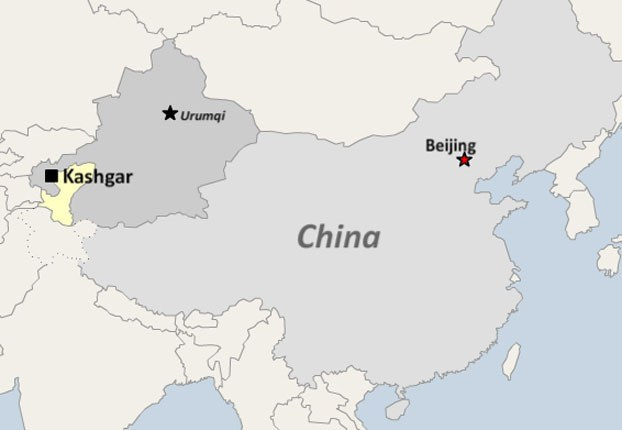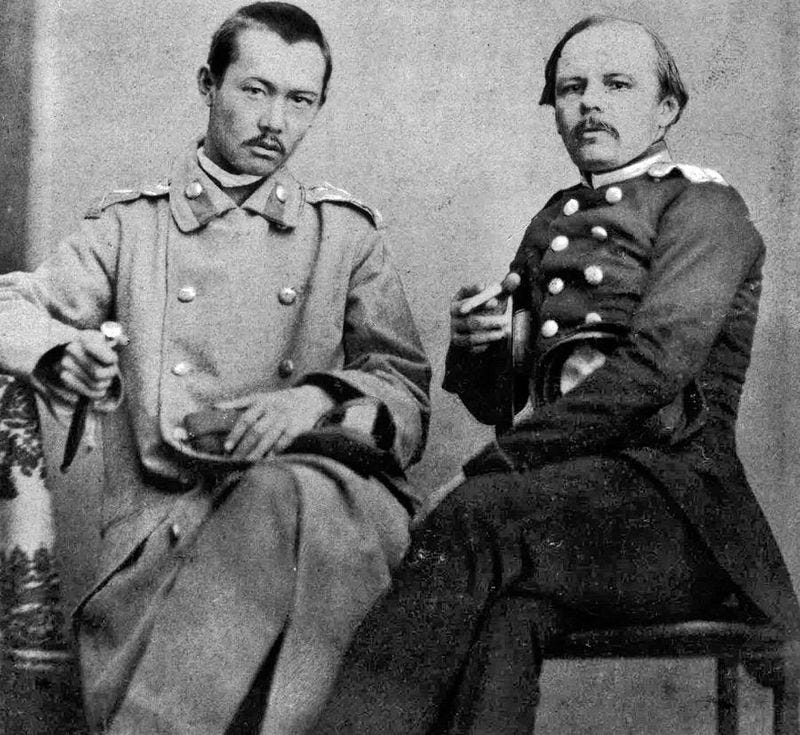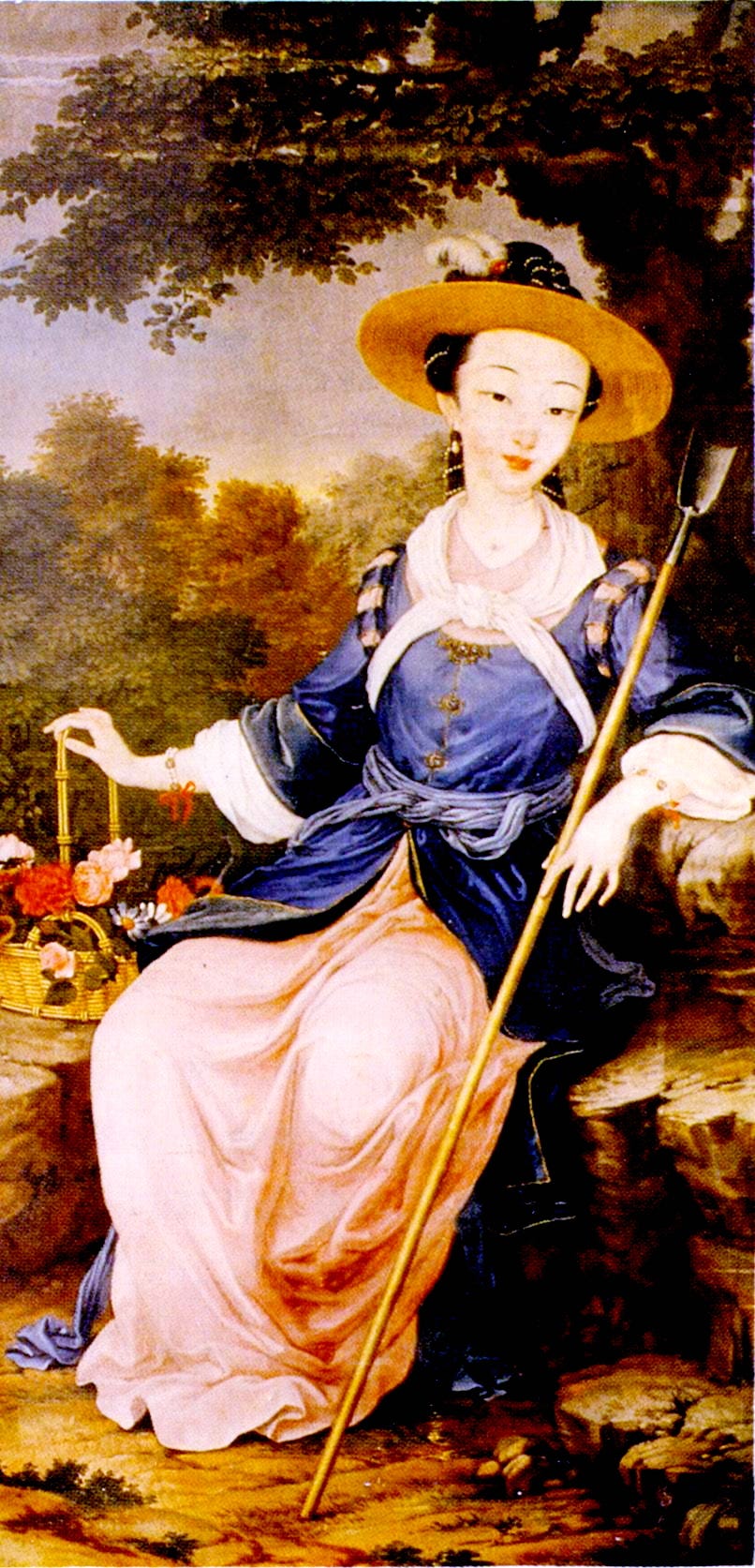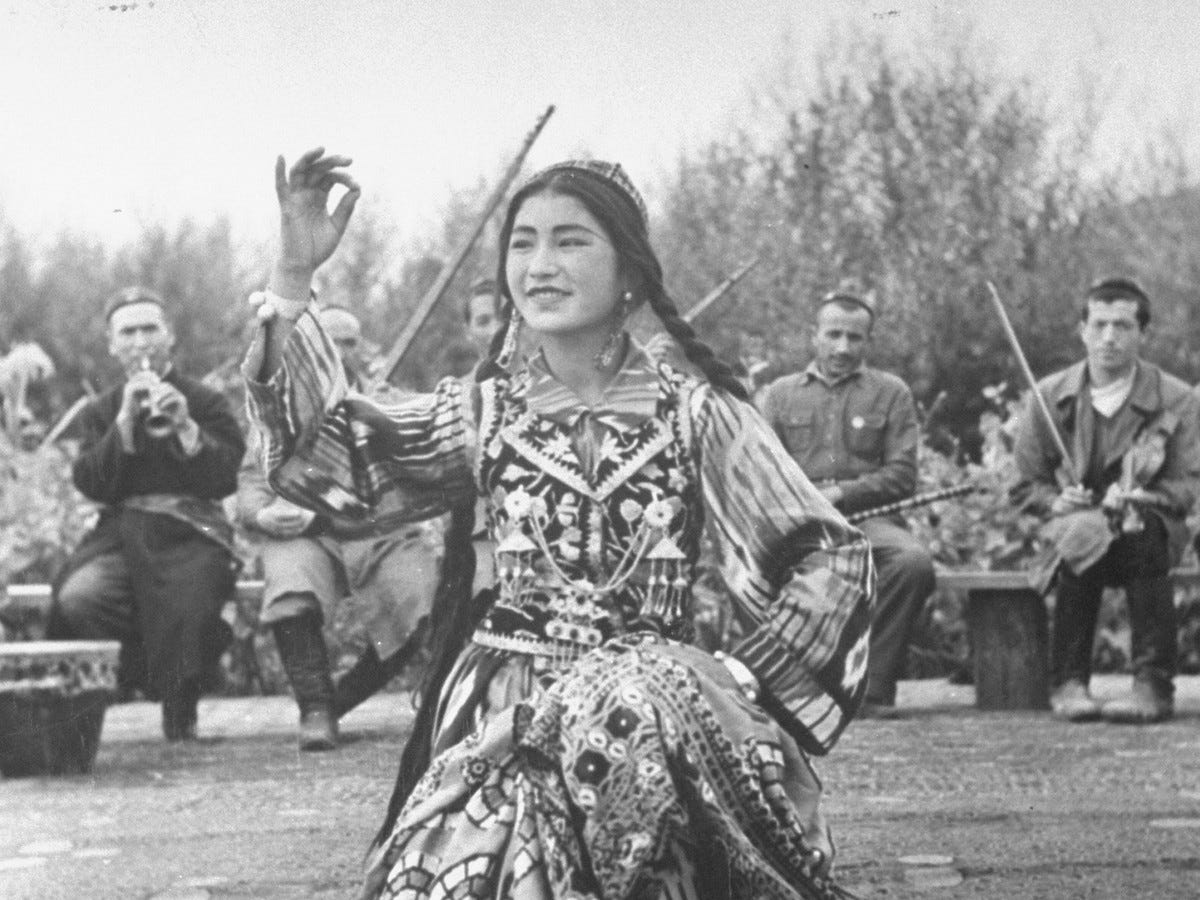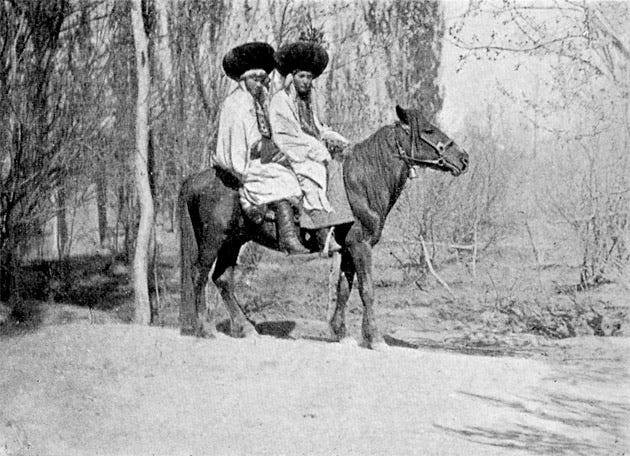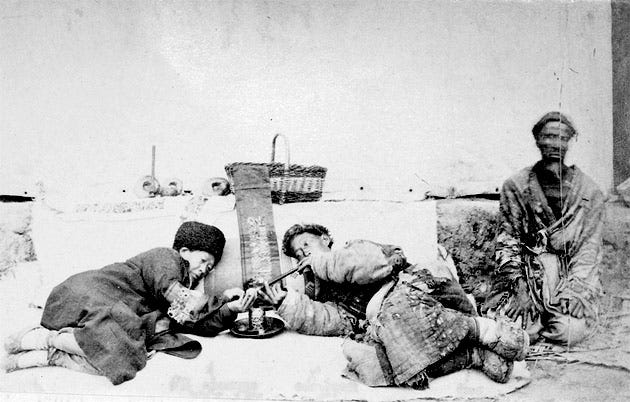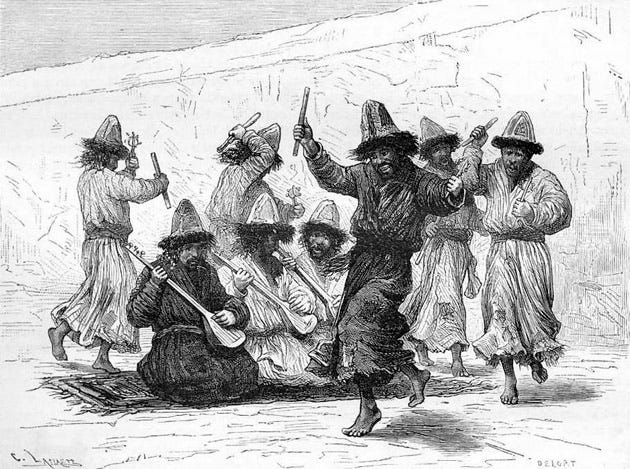The Kashgar Heart Stealers - Chokan Valikhanov, 1859
Translation of a Kazakh spy's report on the usual marriage customs of Chinese Turkestan
Preliminary note: For Gmail readers, this essay might be clipped due to size limitations. To read the entire essay simply click on “View entire message” at the bottom of the email, thanks.
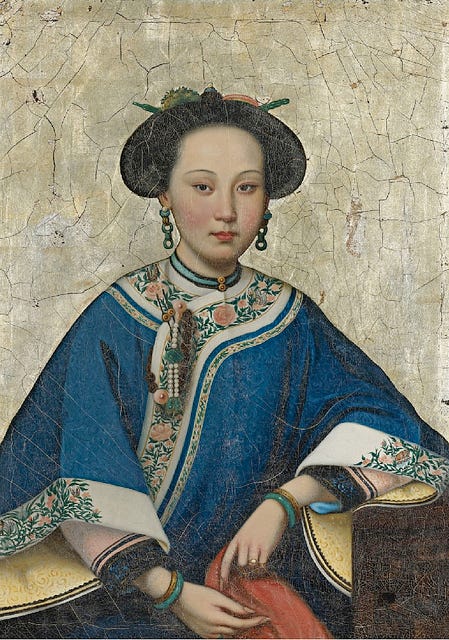
Translator’s Introduction
Below is a translation of two excerpts from Chokan Valikhanov’s essays “О Западном крае Китайской империи” (On the Western Edge of the Chinese Empire) and “О состоянии Алтышара, или Шести восточных городов китайской провинции Нан-лу (Малой Бухарии), в 1858–1859 годах” (On the Conditions of Altyrshar, or the Six Eastern Cities of the Chinese Province Nan-Lu (Little Bukhara), 1858-1859). The source for this translation can be found here.
In these excerpts the very curious custom of “temporary marriage" that existed in Kashgar and other cities of the Tarim Basin is discussed. This custom permits visitors to “marry” a local girl for the duration of their stay. Or to put it crudely, families pimped out their daughters to travelers. As Valikhanov mentions below, this was an custom as Marco Polo writing in the 13th century took note of it. I suspect this custom was likely a result of people trying to draw merchants and other commercial people to their cities. Kashgar and the other cities of the Tarim Basin constitute the historical Silk Road, and thus competition between the city states to attract caravans would have been very intense. Offering up easy access to women was likely method to attract these caravans and their business. This is merely a theory of mine though, and it might be entirely wrong.
Additionally, hot weather tends to cause dissoluteness in people. This can be clearly seen in California among Americans, but also in Europe were those in the south are far more sensuous than those in the north. Kashgar and the Tarim Basin is an extremely hot and dry region, and this likely played some role in this custom’s emergence.
Chokan Chingisovich Valikhanov was an ethnic Kazakh born in 1835 to the Kazakh Middle Horde. His life coincided with the expansion of Russian power across the Kazakh steppes and into Central Asia. Valikhanov studied at an Imperial Cadet school in Omsk, where he learned Russian and was Russified to an extent. As an adult he conducted a series of reconnaissance-espionage missions to regions of Central Asia that Russia had not yet acquired, including Chinese Turkestan, known today as Xinjiang. As a Central Asian himself, Valikhanov was able to infiltrate local society in a way that an European would not have been able to.
For a longer introduction on Valikhanov and his significance in Russian & Kazakh history, as well as his account of joining the Kokand caravan and its approach to Kashgar, see my other translation of Valikhanov’s writing.
Also, somewhat related to the topic at hand, it is worth mentioning Iparkhan, “the Fragrant Concubine”. Iparkhan was the daughter of a Kashgar Khoja (the title of the landowning elite of the Tarim Basin). Shortly after the Qing Dynasty’s conquest of the Tarim Basin she was selected to be a concubine to the Qing emperor Qianglong. Upon reaching the Forbidden City in 1760, Iparkhan became one of Qianlong’s most favored consorts. Her title refers to her intoxicating fragrance. Her portrait was painted several times by Giuseppe Castiglione, the framed Italian Jesuit painter who served the Qing Dynasty (also see first painting in this post).
Lastly, some readers might wonder as I did, if the rampant promiscuity reported below also led to the rampant spread of venereal disease. While not about Kashgar itself, my other translation likely answers this question: a report about the spread syphilis in the Fergana valley by Valerian Kushelevsky from 1891.
On the Western Edge of the Chinese Empire
Kashgar is extremely crowded, populated mainly by Muslims. The Chinese occupy the citadel. The residents of this city are not any different from any other herd of people in regards to their morals. While being Muslims, they openly drink wine, buza1 and they do not keep their women secluded.
Speaking of Kashgar, I cannot fail to mention the women of Kashgar, who are famous for their beauty across all of Middle Asia.2 According to the Asians who have been there, the full moon, gazelles, cypresses, roses are all epithets for the beauties of Kashgar. They are convinced that the water of Kashgar has a miraculous ability to excite love. Even the old Mullahs, who have never once thought about the forbidden fruit, do not leave Kashgar before first giving their beard to some sugar hungry woman. In Kashgar there is a wonderful custom, which might be agreeable to you and does not violate the commandments of Moses, where you can satisfy your need for love until dawn. In short, any visitor to Kashgar can have a temporary wife, legally as according to the law of mutie.3 As you arrive to Kashgar, you will already begin to be in a marvelous mood for love (which occurs due to the miraculous properties of the water), with sinful thoughts taking mastery over you with such power, that you will begin to spontaneously tell a story about the love a moth has for the flame and of Majnun and Layla.4 Your passion will further worsen by the various voluptuous scenes that you will inevitable be witness to. Which ever part of Kashgar you arrive to, you cannot avoid the entertainment of dancers, who will marvelously and tenderly sing the poem of Majnun and Layla. In the end, even if you have a heart of stone, you will not be able to resist such seductive singing, and will turn into a kebab – roasted. Only one thing remains for you to do – marry, as according to the mutie, otherwise you will not be able to satisfy your burning passion. You speak about your desire for one of the natives you are acquainted with, who is quite skilled in such conspiracies. He (your guide), as is typically done, places his hand over his heart and exclaims lively:
“Bash ustuna!5 On my head! It speaks to you, that he will show you such a beauty that Fatima herself, daughter of the prophet,6 a known heart stealer, will be nothing in comparison. Of course, you will rush after him in order to see Fatima.” He goes to the first house he sees and asks:
“Do you have a chauken? (chauken – a young unmarried or widowed women, who leads a free way of life).” The answer is usually: we have (Kashgar is an abyss of chauken).
“How many hats does she have?” – The person asks again.
“Three”. - answers the master of the house.
The person will make a sour grimace and, having said “kerek yok" (there is no need), and pulls you further along. You begin to ask him, what was so dirty about the hats (in other words, what is this nonsense he is talking about?) and explain to him, that what matters is not the hats but the heart. The guide gives a big smile and enters the next house. Three beds are located in the room, richly decorated with embroidered carpets and, you see on each of them a row of hats. The guide joyfully turns his eyes to the bed, on which an entire regiment of hats sticks out, and upon counting them he happily exclaims:
“Mashallah!7 Your star is full ascent, I have found more than a guria8 for you! 20 hats! This is amazingly rare! O soul! Preform namaz9 – you will happier than Suleiman10 himself.” You have come to a surprise and you do not know how to answer. In the end, having gathered your thoughts, you respond: “You Muslim! 20 hats! What are you talking about? Have we come here to trade hats?” Meanwhile, from a half open door whispers and the jingling of metal jewelry can be heard. You see a few black eyes, burning and piercing, you are at a loss for words and in your heart you feel a fire one thousand and one times more powerful than Jahannam,11 in which the blessed prophet Muhammad the Chose One is going to burn us in. The guide, taking advantage of your numbness, approaches the door and whispers a few inaudible words, all that reaches your ears is: “he will give 10 sar12” – he immediately and loudly exclaims, turning to the master of the house, who has been silent this entire time, as people are when they are confident in the quality of the goods on display. “The Khoja (word similar to mirza, or gosnodin13) wants to marry for the price of 20 hats. He, glory to Allah, is a wonderful person!” – and then, lowering his voice, he begins to barter over the dowry.
The master of the house continues to say: “20 hats – this, my son, is more valuable than the treasures of Izhan-khan (the Chinese emperor); try another – 20 hats”. After some bickering he agrees to 25 sar, due to the unusual rarity of the product. The business is over: you give him 25 sar, and the master of the house goes into the inner chambers of his house, in order to dress and bring out the bride for you to see. Meanwhile, the guide explains to you the meaning of the hats and assures you that this a most faithful sign of beauty: she was taken by a husband 20 times as according to the mutie and each time, as according to local custom, she sewed a new hat. You are disgusted, and wonder that after 20 men what beauty can remain, even if she is greater than Zuleikha, the wife of Potiphar.14 He says that you can look, and if you do not like her you can take another.
“And what will happen with my money?” – You ask.
“With the money?” – He exclaims. – “Mashallah! You will not be made an ass: the money was paid, and hence, it is no longer yours.”
Suddenly a powerful strumming can be heard, as if from a whole chain of donkeys, and the door opens and an entire mob of girls comes to you. Of them one is more complete, and hence, more beautiful, with an amazing sense of dignity and self-confidence, and she steps forward to you. The remaining girls encircle you from all sides. You see nothing but a white veil and the luxurious forms of your betrothed. The beauty takes an apple and breaks it in half, eats one half herself and presents the other to your mouth. You start to get impatient, but your host continues to treat you to pilov15 and buza. Meanwhile, except for your bride, all the other chakeuns have removed their veils: your heart turns upside down and your belly turns to water. You see the big velvety eyes of a gazelle, luxurious and wide hips of one – another is like a cypress tree – the third, in short, Allah won’t know what you see here.16 Having tortured you enough, the girls demand a peshkesh17 for them to reveal the face of your partner and having received it, with singing and dancing solemnly, they begin to quietly lift up the veil, like it’s a curtain in a theater.
Suddenly: “O Allah! O Muhammad”, - before you appears a true lover for the centuries, rouged red and whitened with powder, only the devil knows of such! If you are a lover of eastern bliss and keif,18 then “mashallah!” You will not need pillows, instead you can drown in her luxuriously soft embrace. Yes indeed, what true Asian, who knows at least a little of the world and who considers himself an expert of excellent taste and pleasures, can look upon such soft legs without delight, and is said here, the fatty parts around her hips. If you have not managed to reach such a high understanding of beauty and instead prefer a boney subject, then there is still one for you, and place your trust in Allah and run, you must run, and do not get caught up with the number of hats.
In Kashgar a girl can marry an indefinite amount of times, in short, until you leave, but as according to the law laid down by the Chinese authorities you can never take her away. All Asian merchants say this law is founded on a rare line of thinking, that, because many have been captivated by the beauty of the girls of Kashgar, many will remain within the Chinese empire forever.
On the Conditions of Altyrshar, or the Six Eastern Cities of the Chinese Province Nan-Lu (Little Bukhara), 1858-1859
The best of Kashgar’s moderation is expressed by the positive position of women in home and social life. Women in Little Bukhara19 occupy an honorable place, and many of them have acquired historical renown. (…) Women take part in pleasures with their husbands, and their presence during meetings is considered normal. Examples of polygamy among Turkestanis is rare, because the wife can leave her husband whenever she wants. If the wife wants a divorce, then she cannot take anything from the home. If the husband wants one, then he must provide for her existence. One amazing deviation from Islamic law are temporary marriages. Even more amazing is that for the Kashgar Sunnis of the Hanif teaching,20 temporary marriage are not allowed. This custom is a holdover from pagan times. Marсo Polo says that the people of Hami,21 upon accepting a guest, would leave them with their wives and in order for him to use her in complete freedom, the husband would leave the house. When Kublai22 ended this custom the envoys of Hami disturbed the monarch to such an extent that he was forced to alter his edict. Currently, this custom is subordinate to Muslims forms: the marriage is carried out as according the Sharia,23 and divorce as well.
Temporary marriages reign supreme throughout the region of the Six Cities,24 which are visited by many foreigners, and in the region to the east of Kucha this custom has changed because they are not visited by foreign caravans. The conditions of these marriages are complicated: from the husband it is required to clothe and feed their wife. In Khotan, wives must be purchased, and cost 1 silver ruble and 50 kopeks in our money.25 In Yarkent there is a special bazar where a woman who seeks marriage can be met. Temporary wives are more expensive in Aksu and Turfan. Due to this custom, despite women being entirely free to choose who they marry and how they feel, the women are not known for their particularly clean morals, which is a result of their lack of education and their lack of the concept of honor.
Muhammad, who excluded women from society and forbid wine, thought he would guarantee the morality of his flock, but from this came a much more powerful type of depravity. The Muslims replaced wine with intoxicating smoke and extracts,26 which are far more destructive than wine.
In order to have fun, Central Asians use hashish, opium and juice from the sliced heads of poppies. People, who have a passion for using these things, consist of a large class of useless people - bengs.27
The ruinous passion for these stupefying substances comes with physical weakness and a special kind of craziness. Lower class bengs feed themselves by becoming dervishes and begging for alms. In Kashgar there are very many bengs, and all common people use hashish. Officials drink wine in imitation of the Chinese and smoke as Chinese do. The use of wine and buza in Kashgar is not criminalized by the authorities.
The Chinese run drinking shops, and outside the city there are a few places where buza is produced. Taverns with buza are always full of visitors. Foreigners who live in Kashgar, taking advantage of the free morals of the place, indulge in depravity without restraint. For them, accustomed to the constant fear of living under the despotic absolutism of their rulers, wine and women are especially tempting.
Dice games are common among all the classes in Little Bukhara, even women partake in this vice. Bengs, smokers and kumarvaz – gamblers, constitute the most violent and stubborn class of people and they take an active part in all revolutionary activity. In Bukhara and Kokand, the women there are not particularly different in terms of the cleanliness of their morals, but are differentiated due to their external situation where they are locked away, surrounded by jealous guards, and limited to harem intrigues. There are no public women there, and fear of punishment keeps them from debauchery. In Bukhara adultery is punished by stoning. In Little Bukhara, women, as we have discussed earlier, are free in their actions, and due to this the number of promiscuous women, that are known to the police, in the Six Cities has developed to such a degree that it frightens not only the Central Asian Muslims, but even the Chinese. All the Chinese have had local women, some even having children with them, which are considered local and not Chinese. On the outskirts of the city there are many brothels, in which women indulge in filthy debauchery. The reasons for the significant number of women in Kashgar with fallen morals is a result of largely poverty and necessity.
A fermented drink with a low alcohol percentage made from various grains. Found in the Middle East, Central Asia and other neighboring regions
Russians of this era often referred to Central Asia as Middle Asia
“на основании закона о мутие”. I am not sure what this law is, and I could not find any information about it
An Arabic love story from the 7th century
“Баш устуна!” Kazakh/Kyrgyz/Uyghur for “On my head” or “heads up”
Muhammed’s daughter Fatima, who married Ali, who Shia Muslims believe to have been the rightful Caliph before he was martyred
Arabic for “God has willed it”
A beautiful woman that will be rewarded to the righteous in Islamic heaven
Muslim prayer in the direction of Mecca
King Solomon from the Old Testament
Islamic hell
I am unsure what this means. Likely type of currency
Russian word for “lord”, “sir”, etc
Zuleikha is the Islamized name for Potiphar's wife, from Genesis, in the Old Testament. Potiphor was a captain of the Pharaoh’s guard
Central Asian dish usually consisting of rice, carrots, raisins and lamb
I’m not sure if I translated this properly. Original says “третьей; словом, Аллах весть, чего тут не увидите.”
Persian word for “gift”
Turkic word meaning “pleasure”, “enjoyment”, “euphoria”
It appears that Russians of this time and earlier often referred to the cities of the Tarim Basin as “Little Bukhara”
A teaching the promotes pure monotheism, without any idolatry or paganism
Another city in Xinjiang (Chinese Turkestan), the most eastern major city, closest to the Great Wall
Kublai Khan, emperor of the Mongolian Empire and the Yuan Dynasty
Islamic law
Also known as Altishahr. Refers to the six main cities of the western end of Tarim Basin, including the cities of Kashgar, Khotan, Yarkent, Aksu, Kucha, and Yengi Hisar
This is Russian currency
Such as aromas, etc
Gypsy word for “devil”.




